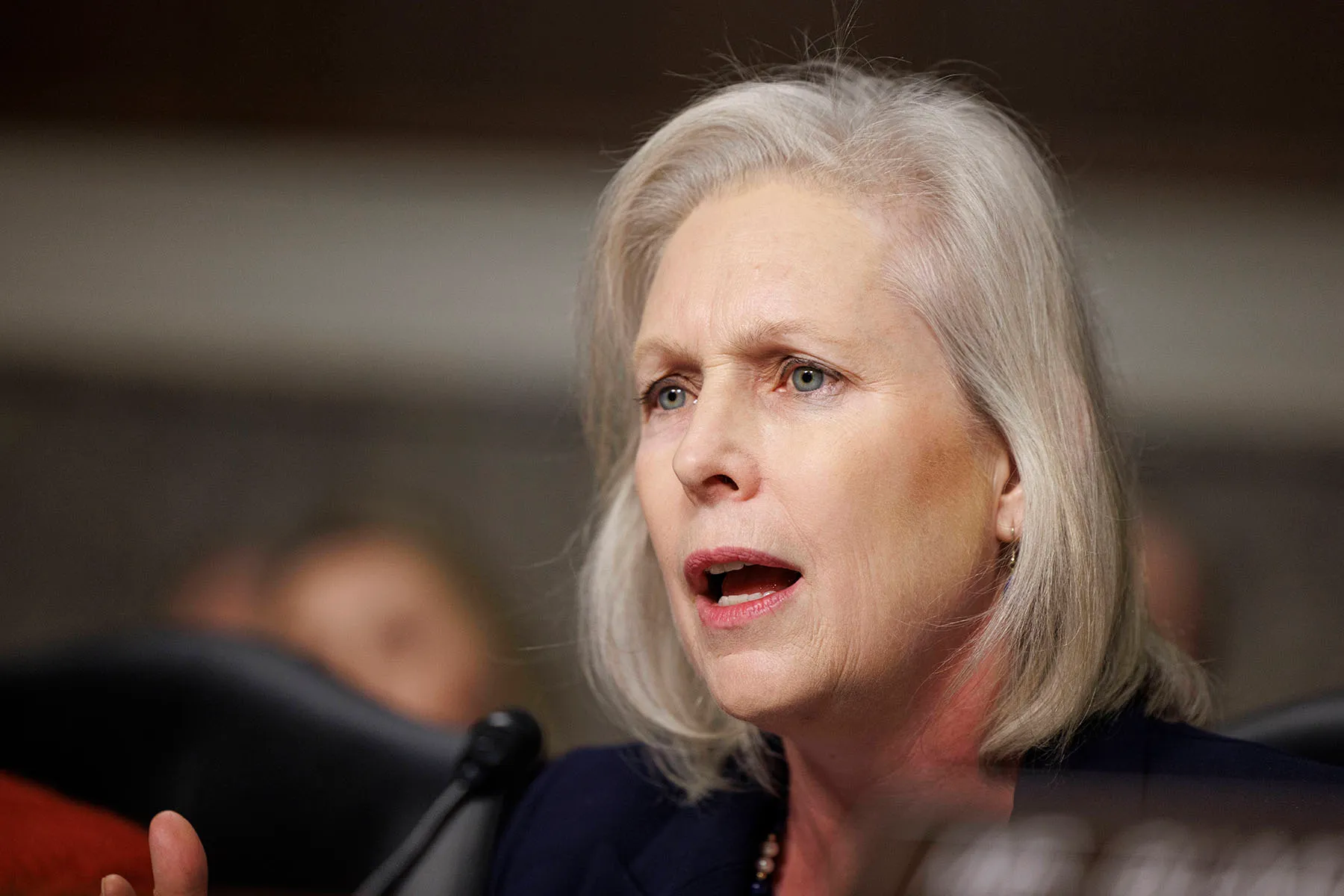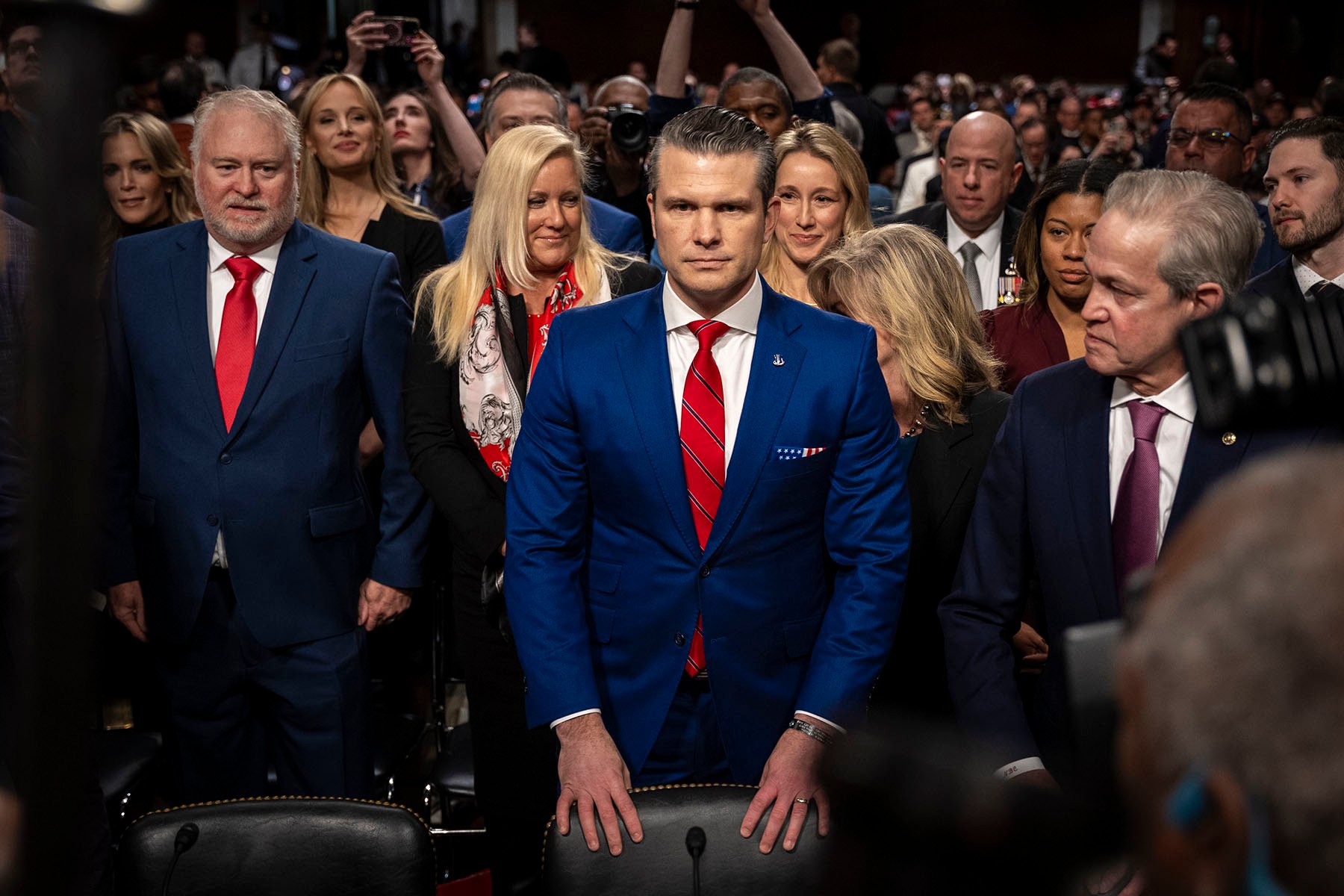Pete Hegseth, President Donald Trump’s pick for secretary of defense, faced more than three hours of questioning under oath Tuesday in a hearing that included many contentious exchanges with Democrats on everything from whether women should serve in combat to allegations of sexual misconduct against him. Each member of the Senate Armed Service Committee had about seven minutes to question the nominee.
“As I’ve said to many of you in private meetings, when President Trump chose me for this position, the primary charge he gave me was to bring the warrior culture back to the Department of Defense,” Hegseth said in his opening statement. “He, like me, wants a Pentagon laser-focused on lethality, meritocracy, war fighting, accountability and readiness.”
Some of the most contentious moments of the hearing were when women senators confronted Hegseth about his past comments stating that women should not serve in combat roles. Many quoted directly from Hegseth’s own book and from podcast appearances he made as recently as November before he was nominated for the position.
Many Democratic senators also sharply criticized the fact they asked for but did not receive meetings with Hegseth prior to his hearing. Hegseth met with only one Democrat on the committee, ranking member Sen. Jack Reed of Rhode Island, and with Sen. John Fetterman of Pennsylvania, who is not a member of the committee. Some Democrats also decried the fact they only received one round of questions for Hegseth, described a lack of transparency from Hegseth on his past leadership of two veterans nonprofits and were not provided access to the Federal Bureau of Investigations background report on Hegseth. Only Sens. Roger Wicker of Mississippi, the committee chairman and a Republican, and Jack Reed of Rhode Island, the top-ranking Democrat in the committee, were able to review the report, which Reed argued was “insufficient.”
“You say you’ve had personal issues in your past. Yet, when asked about those very issues, you blame an anonymous smear campaign, even when many of these claims are not anonymous,” said Democratic Sen. Mark Kelly of Arizona. “Which is it? Have you overcome personal issues or are you the target of a smear campaign? It can’t be both. It’s clear to me you’re not being honest with us or the American people because you know the truth would disqualify you from getting the job.”
Throughout the hearing, Hegseth denied allegations of financial mismanagement, excessive drinking and sexual misconduct, blaming a “left-wing media in America” that “doesn’t care about the truth” and only wants to “destroy me.” He claimed anonymous sources were spreading false allegations and denied ever disparaging women in the military, despite having quotes from his own book read back to him. Hegseth took an unapologetic tone, though he admitted he is not a perfect person who has converted to become a better man due to the influence of his wife and his Christian faith.
Most of the women questioning Hegseth were Democrats: The Democratic side of the Armed Services Committee is about evenly split between men and women, while only two of the 14 members on the Republican side are women.
Here are some of the Democratic senators’ questions and Hegseth’s responses, edited for clarity and length:
Women in combat
Sen. Jeanne Shaheen of New Hampshire: You’ve made a number of surprising statements about women serving in the military. As recently as November 7 of 2024 on the Shawn Ryan Show, you said, “I’m straight up saying that we should not have women in combat roles. It hasn’t made us more effective.” Mr. Hegseth, do you know what percentage of our military is comprised of women? It’s almost 18 percent, and in fact a DoD demographic report indicated that there are more women serving now and there are fewer separations, so they make up a critical part of our military — wouldn’t you agree?
Hegseth: Yes, ma’am. Women in our military, as I’ve said publicly, have and continue to make amazing contributions across all aspects of our battlefield.
Shaheen: Well you also write in your book “The War on Warriors” in the chapter “The Deadly Obsession with Women Warriors” that “not only are women comparatively less effective than men in combat roles, but they are more likely to be objectified by the enemy and their own nation in the moral realms of war.” Mr. Hegseth, should we take it to believe that you believe that the two women on this committee [Sens. Joni Ernst and Tammy Duckworth] who have served honorably and with distinction made our military less effective and less capable?
Hegseth: I would like to clarify when I’m talking about that issue, it’s not about the capabilities of men and women. It’s about standards. And this committee has talked a lot about standards — standards that we unfortunately over time have seen eroded in certain duty positions, certain schools, certain places, which affects readiness. Which is what I care about the most: readiness on the battlefield.
Shaheen: Why should women in our military believe that they would have a fair shot and an equal opportunity to rise through the ranks if on the one hand, you say that women are not competent, they make our military less effective. And on the other hand, you say, “Oh no, now that I’ve been nominated to be secretary of defense, I’ve changed my view on women in the military.” What do you have to say to the almost 400,000 women who are serving today about your position on whether they should be capable to rise through the highest ranks of our military?
Hegseth: I would say I’d be honored to have the opportunity to serve alongside you, shoulder to shoulder, men and women, Black, White, all backgrounds with a shared purpose. Our differences are not what define us. Our unity and our shared purpose is what define us, and you will be treated fairly.

Sen. Kirsten Gillibrand of New York: You will have to change how you see women if you are to do this job well, and I don’t know if you are capable of that. So I want to press on these issues that my colleague Jeanne Shaheen brought up because she said it so well. You’ve denigrated active-duty service members. We have hundreds of women who are currently in the infantry — lethal members of our military serving in the infantry. But you degrade them. You say we need moms, but not in the military — especially in combat units. Specifically, as secretary, would you take any action to reinstitute the Combat Arms Exclusion for Female Servicemembers, knowing full well you have hundreds of women doing that job right now? And the standards, these are the requirements today for people serving in the infantry, men and women, they are gender neutral and they are very difficult to meet. They have not been reduced in any way and our combat units, our infantry is lethal. So please explain these statements because they’re brutal, and they’re mean. And they disrespect men and women who are willing to die for this country.
Hegseth: I have never disparaged women serving in the military. I respect every single female service member that has put on the uniform, past and present. My critiques, Senator, recently and in the past, and from personal experience, have been instances where I’ve seen standards lowered.
Gillibrand: Give me one example.
Hegseth: Commanders meet quotas to have a certain number of female infantry officers or infantry enlisted. And that disparages those women who are incredibly capable of meeting that standard.
Gillibrand: Commanders do not have to meet quotas for women in the infantry. That does not exist. And your statements are creating the impression that these exist. They do not. We want the most lethal force, but I’m telling you, having been here for 15 years listening to testimony about men and women in combat and the type of operations that were successful in Afghanistan and Iraq. Women were essential for many of those units. When Ranger units went in to find where the terrorists were hiding in Afghanistan or in Iraq, if they had a woman in the unit, they could go in, talk to the women in a village, say where are the terrorists hiding, where are the weapons hiding, and get crucial information to make sure that we can win that battle. So just you cannot denigrate women in general, and your statements do that.

Sen. Elizabeth Warren of Massachusetts: What I see is there’s a 32-day period in which you suddenly have a different description of your views on women in the military. And I just want to know — what changed that the song you sang is not the song you come in here today to sing?
Hegseth: Senator, the concerns I have and the concerns many have had, especially in ground combat units, is that in pursuit of certain percentages or quotas, standards have been changed and that makes combat more difficult for everybody involved.
Warren: Let me make a suggestion of what changed in those 32 days — you got a nomination from President Trump. Now I’ve heard of deathbed conversions, but this is the first time I’ve heard of a nomination conversion.
LGBTQ+ service members
Gillibrand: You have also denigrated members of the LGBTQ community. Did you know that when Don’t Ask, Don’t Tell [a policy barring service members from being openly LGBTQ+] was in place, we lost so many crucial personnel — over a thousand — in mission-critical areas. We lost 10 percent of all of our foreign language speakers because of a political policy. You said in your statement you don’t want politics in the DoD. Everything you’ve said in these public statements is politics: I don’t want women; I don’t want moms. And what’s wrong with a mom, by the way? Once you have babies, you therefore are no longer able to be lethal? I mean you’re basically saying women after they have children can’t ever serve in the military in a combat role. It’s a silly thing to say. It’s a silly thing to say — beneath the position that you are aspiring to. To denigrate LGBTQ service members is a mistake. If you are a sharp shooter, you’re lethal regardless of what your gender identity is, regardless of who you love.
Hegseth: As the president has stated, I don’t disagree with the overturn of Don’t Ask, Don’t Tell.
Abortion access in the military
Sen. Mazie Hirono of Hawaii: Current DoD policy allows service members and eligible dependents to be reimbursed for travel associated with non-covered reproductive health care, including abortions. Will you maintain this common sense policy?
Hegseth: I’ve always been personally pro-life. I know President Trump has as well, and we will review all policies. Our standard is whatever the president wants on this particular issue. I don’t believe the federal government should be funding travel for abortion.
Military sexual assault crisis
Republican Sen. Joni Ernst of Iowa: A priority of mine has been combatting sexual assault in the military and making sure that all of our service members are treated with dignity and respect. This has been so important. Senator Gillibrand and I have worked on this, and we were able to get changes made to the Uniform Code of Military Justice to make sure that we have improvements on how we address the tragic and life-altering issues of rape, sexual assault. It will demand time and attention from the Pentagon under your watch if you are confirmed. So as secretary of defense, will you appoint a senior-level official dedicated to sexual assault prevention and response.
Hegseth: Senator, as we have discussed, yes I will.
Responding to allegations of sexual misconduct
Hegseth paid a confidential settlement to a woman who accused him of sexually assaulting her at a Republican women’s conference in Monterey, California, in October 2017. She reported the matter to police, but no charges were ever filed against Hegseth. He and his representatives have maintained that the encounter, which took place while he was still legally married to his second wife, was consensual.
Hegseth has also been accused in a whistleblower report of presiding over a toxic work environment for women at Concerned Veterans for America, a nonprofit he led from 2013 to 2016. He has denied wrongdoing.
Hirono: Since you became a legal adult, have you ever made unwanted requests for sexual favors or committed any verbal or physical harassment or assault of a sexual nature?
Hegseth: No, Senator.
Hirono: Have you ever faced discipline or entered into a settlement relating to this kind of conduct?
Hegseth: Senator, I was falsely accused in October of 2017. It was fully investigated, and I was completely cleared.
Hirono: I don’t think completely cleared is accurate, but the fact is that your own lawyer said that you entered into an NDA [non-disclosure agreement], paid a person who accused you of raping her a sum of money to make sure that she did not file a complaint.
Sen. Tim Kaine of Virginia: You’ve admitted that you’ve had sex with that woman at that hotel in October 2017. You said it was consensual, isn’t that correct? You’ve admitted that it was consensual, and you were still married and you just had a child by another woman. How do you explain your judgment?
Hegseth: Again, completely false charges against me. They were fully investigated and I was completely cleared.
Kaine: You have admitted you had sex while you were married to wife two after you just had fathered a child by wife three. You’ve admitted that. Now, if it had been a sexual assault, that would be disqualifying to be secretary of defense, wouldn’t it?
Hegseth: It was a false claim then, it’s a false claim now.
Kaine: If it had been a sexual assault, that would be disqualifying to be secretary of defense, wouldn’t it?
Hegseth: That was a false claim. You’re talking about a hypothetical.
Kaine: So you can’t tell me whether someone who has committed sexual assault is disqualified from being secretary of defense?
Hegseth: In my instance, and I’m talking about my instance only, it was a false claim.
Kaine: But you acknowledge that you cheated on your wife and you cheated on a woman by whom you had just fathered a child? You have admitted that.
Hegseth: I will allow your words to speak for themselves.
Addressing allegations of alcohol abuse and mismanagement
Hirono: I have read multiple reports of you regularly being drunk at work, including by people who worked with you at Fox News. Do you know that being drunk at work is prohibited for service members under the UCMJ?
Hegseth: Senator, those are multiple false, anonymous reports peddled by NBC News that run directly contradictory to the dozens of men and women at Fox News Channel who I work with who came on the record and said that they’d never seen that.
Hirono: You recently promised some of my Republican colleagues that you will stop drinking if confirmed, correct?
Hegseth: Absolutely.
Hirono: Will you resign as secretary of defense if you drink on the job, which is a 24/7 position?
Hegseth: I’ve made this commitment on behalf of the men and women I’m serving because it’s the most important deployment of my life.





